沪教社小学英语七年级下册同步练习册 基本功训练 课堂精练_2
七年级英语下册同步练习册答案
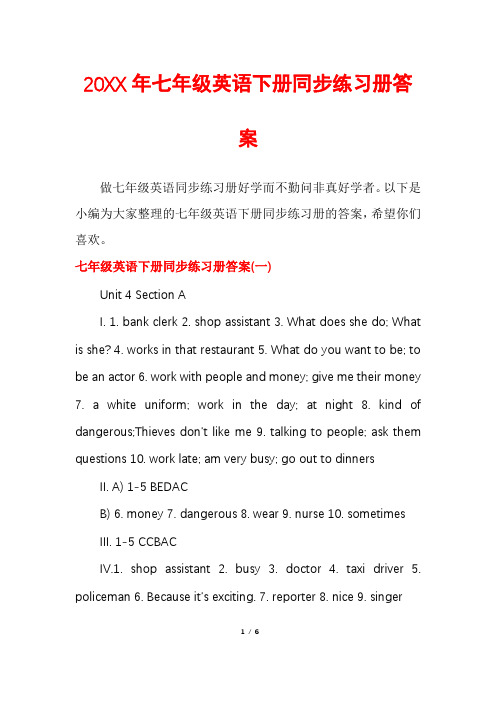
20XX年七年级英语下册同步练习册答案做七年级英语同步练习册好学而不勤问非真好学者。
以下是小编为大家整理的七年级英语下册同步练习册的答案,希望你们喜欢。
七年级英语下册同步练习册答案(一)Unit 4 Section AI. 1. bank clerk 2. shop assistant 3. What does she do; What is she? 4. works in that restaurant 5. What do you want to be; to be an actor 6. work with people and money; give me their money 7. a white uniform; work in the day; at night 8. kind of dange rous;Thieves don’t like me 9. talking to people; ask them questions 10. work late; am very busy; go out to dinners II. A) 1-5 BEDACB) 6. money 7. dangerous 8. wear 9. nurse 10. sometimesIII. 1-5 CCBACIV.1. shop assistant 2. busy 3. doctor 4. taxi driver 5. policeman 6. Because it’s exciting. 7. reporter 8. nice 9. singer1/ 610. Because she likes singing.Section BI. 1. work hard 2. other young people 3. work for a magazine4. school play5. a busy job6. a newspaper reporter7. work; works in a hospital8. as a waiterII.1-5 BCCABIII.1-5 CAEBDIV. 1-5 BABBCSelf Check 1I. 1. an international school for children of 5-12 2. to teach soccer; volleyball and tennis 3. a music teacher to teach guitar; piano,violinII. 1. Does;want 2. Where does 3. to him 4. does;do 5. What;beIII.1-5 CBADEIV. 1-5 BCCBASelf Check 2Ⅰ. 1-5 BCABA 6-10 BACACII. 1-5 ABBACIII.One possible version:Do you like English? Do you like to sing and dance? Do you2/ 6like to work hard? Do you love children? Do you want to be anEnglish teacher? If your answer is “Yes”; please call Mr Wang at *****.七年级英语下册同步练习册答案(二)Unit 5Section AI. 1. do homework 2. watch TV 3. eat have dinner 4. talk on the phone 5. go to the movies 6. write a letter 7. wait for 8. talk to/with9. read books 10. are; doing; watching 11. doing; is doing homework 12. doing; is reading 13. to go to the movies; Certainly; boring; When; Let’s go 14. waiting for 15. reading 16. talkin g to 17. talking about 18. goingII.1-5 CACBCIII. 1-5 DBAECSection BI. 1. thanks for 2. in the first photo 3. play basketball 4. at the swimming pool 5. in the last photo 6. be with 7. photo of my family 8. play soccer 9. Thanks for 10. some of my photos11. first; playing basketball 12. swimming 13. are eatingdinner 14. last; with;doing homework;watching TV 15. swimming;3/ 6I’m notII.1-5 BBACBIII.1-5 ACBABSelf Check 1I. 1-5 CCAACII. 1-5 CBCAA 6-10 CBBCAIII. 1. There are some students in the classroom.2. Two boys are cleaning the windows.3. Wang Fang and Han Mei are talking.4. Li Lei is reading a book.5. Jenny is drawing a picture.Self Check 2I. 1. —What are you doing?—I’m reading books.2. —Are they swimming?—No, they are playing basketball.3.We are eating/having dinner.4. —Is he watching TV?—No, he is doing (his) homework.5. —What are you doing?—We are playing football.4/ 66. I’m not sleeping. I’m watching TV.7. Do you want to go to the library with me?8. The TV show is very boring.9.When do you want to swim?10. Here is a photo of his family.II. 1-5 AABBC 6-10 ACCBAIII. 1-5 BACBA七年级英语下册同步练习册答案(三)Unit 6Section AI. 1. snowy / snowing 2. playing 3. is 4. are running 5. cleanII.1-5 BBAACIII. 1-6 FBDEACIV. 1-5 FTFTTSection BI.1-5 BACCAII. A) 1. reporter 2. cooking 3. sleep 4. hot 5. doctorB) 6. windy 7. actor 8. are watching 9. playing 10. westIII. A) 1. not bad 2. studying inToronto 3. cold and snowing4. pretty good5. sunny and hotB) 6-10 FTFTF5/ 6Self Check 1I. 1-5 BACBCII. 1. What is the weather like now? 2. What are you doing at home? 3. That sounds like fun. 4. How is it going with your family?5. She is calling to say happy birthday.III.1. How’s;weather 2. What’s the weather like 3. What is; wearing 4. What’s the weather like 5. What an interesting place 6. What bad 7. very snowySelf Check 2I. 1. How’s the weather; What’s the weather like; hot and wet2. How’s it going; Great3. Thank you for joining4. beautiful; sunny5. many people; on vacation6. Some; taking photos; others are lying7. Look at; group8. surprised9. a veryinteresting place 10. really very relaxed 11. It’s winter 12. having a good time 13. drinking 14. when it’s raining6/ 6。
沪外教版 初中英语 七年级下册 配套练习册 一课一练 基本功训练_63
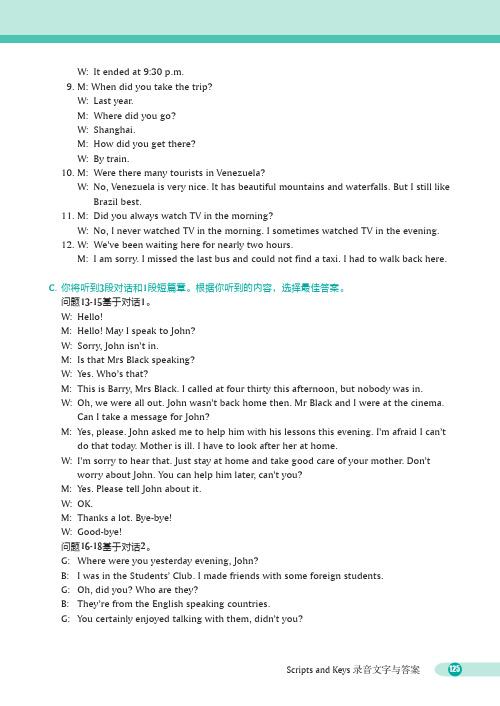
W: It ended at 9:30 p.m.9. M: When did you take the trip?W: Last year.M: Where did you go?W: Shanghai.M: How did you get there?W: By train.10. M: Were there many tourists in Venezuela?W: No, Venezuela is very nice. It has beautiful mountains and waterfalls. But I still like Brazil best.11. M: Did you always watch TV in the morning?W: No, I never watched TV in the morning. I sometimes watched TV in the evening. 12. W: We’ve been waiting here for nearly two hours.M: I am sorry. I missed the last bus and could not find a taxi. I had to walk back here. C. 你将听到3段对话和1段短篇章。
根据你听到的内容,选择最佳答案。
问题13-15基于对话1。
W: Hello!M: Hello! May I speak to John?W: Sorry, John isn’t in.M: Is that Mrs Black speaking?W: Y es. Who’s that?M: This is Barry, Mrs Black. I called at four thirty this afternoon, but nobody was in.W: Oh, we were all out. John wasn’t back home then. Mr Black and I were at the cinema.Can I take a message for John?M: Y es, please. John asked me to help him with his lessons this evening. I’m afraid I can’t do that today. Mother is ill. I have to look after her at home.W: I’m sorry to hear that. Just stay at home and take good care of your mother. Don’t worry about John. You can help him later, can’t you?M: Y es. Please tell John about it.W: OK.M: Thanks a lot. Bye-bye!W: Good-bye!问题16-18基于对话2。
七年级英语下册同步练习册参考答案
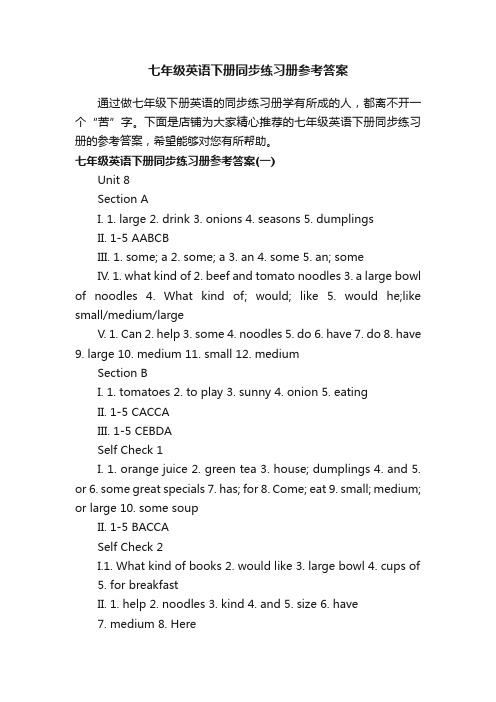
七年级英语下册同步练习册参考答案通过做七年级下册英语的同步练习册学有所成的人,都离不开一个“苦”字。
下面是店铺为大家精心推荐的七年级英语下册同步练习册的参考答案,希望能够对您有所帮助。
七年级英语下册同步练习册参考答案(一)Unit 8Section AI. 1. large 2. drink 3. onions 4. seasons 5. dumplingsII. 1-5 AABCBIII. 1. some; a 2. some; a 3. an 4. some 5. an; someIV. 1. what kind of 2. beef and tomato noodles 3. a large bowl of noodles 4. What kind of; would; like 5. would he;like small/medium/largeV. 1. Can 2. help 3. some 4. noodles 5. do 6. have 7. do 8. have 9. large 10. medium 11. small 12. mediumSection BI. 1. tomatoes 2. to play 3. sunny 4. onion 5. eatingII. 1-5 CACCAIII. 1-5 CEBDASelf Check 1I. 1. orange juice 2. green tea 3. house; dumplings 4. and 5. or 6. some great specials 7. has; for 8. Come; eat 9. small; medium; or large 10. some soupII. 1-5 BACCASelf Check 2I.1. What kind of books 2. would like 3. large bowl 4. cups of5. for breakfastII. 1. help 2. noodles 3. kind 4. and 5. size 6. have7. medium 8. HereIII. 1-5 FFTFT七年级英语下册同步练习册参考答案(二)Unit 9Section AI. 1. were; was 2. meet; met 3. having 4. called; was; said 5. did; playedII. 1-5 CCBAAIII. 1. on Saturday morning 2. last weekend 3. do; homework 4. do some reading 5. beautiful beach 6. clean one’s room 7. the library 8. the movies 9. the pool 10. play tennis 11. play volleyball 12. play the guitar 13. study for 14. practice English 15. great; OK; wasn’t 16. did; do; stayed; studied for the math test; What about; visited 17. On Saturday eveningSection BI.A) 1. week 2. practise 3. spend 4. test 5. middleB) 6. cleaned 7. had 8. wanted 9. was 10. visitedII. 1-5 BAABCIII. 1. practise one’s guitar 2. stay at home 3. study for the test 4. in the afternoon 5. study geography 6. a little difficult 7. play sports 8. clean the room 9. go shopping 10. have a busy weekend/day 11. play chess 12. play computer games 13. play soccer with 14. visit friends 15. watch a movie 16. watch TV 17. read a book about history 18. For most kids 19. went shopping 20. had a busy weekendSelf Check 1st month 2. sad 3. go for a walk 4. play with 5. sit down 6. look for 7. watch; do 8. enjoys their weekendsII. 1. She was at school two hours ago.2. He wasn’t a great singer in 1999.3. He (often) went to the mountains with his friends lastmonth.4. I wrote a letter to my brother yesterday evening.5. He had a glass of milk this morning.III. 1-5 BCACBSelf Check 2Ⅰ. 1. what about 2. to have 3. stayed at 4. talk show 5. How; spendⅡ. 1-5 CDAEBⅢ. 1-5 CBACB 6-10 CAABB七年级英语下册同步练习册参考答案(三)Unit 10Section AI. 1. summer 2. center 3. exam 4. expensive 5. decideII. 1-5 BCBABIII. 1. go to the mountains 2. stay at home 3. visit my uncle 4. go to summer camp 5. visit museums 6. go on vacation 7. study for exam 8. pretty good 9. did; go on vacation; went; was; was pretty good 10. were; were 11. was; was hot; rainy 12. How were; were unfriendlySection BI.A) 1. awful 2. walk 3. classmate 4. waterB) 5. cry 6. exams 7. rainy 8. wereII. 1-5 CBBBAIII. 1-5 CDEABSelf Check 1I.1. didn’t make 2. Did; go 3. What did; do 4. Where did; go5. went shopping II.1. did; go; summer camp 2. How; were; unfriendly 3. Did; No 4. makes me clean 5. had fun talking III. 1-5 ABCACSelf Check 2I. 1-5 CBABC 6-10 ABCBAII. One possible version:Sunday, April 9thThe weather was fine. All my classmates went to the park.We climbed the hills, boated on the lake, and flew kites all morning.At noon, we had a picnic near a big tree. In the afternoon, some girlssang and danced, some boys talked in English, and some studentsplayed games there. When we went home, it was late. I was tired, butI was really happy.。
新版人教版七年级下册英语课堂同步练习试题 全册
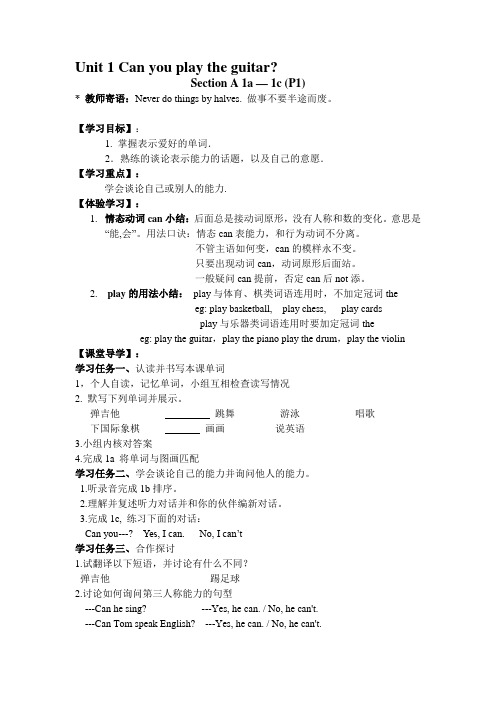
Unit 1 Can you play the guitar?Section A 1a — 1c (P1)* 教师寄语:Never do things by halves. 做事不要半途而废。
【学习目标】:1. 掌握表示爱好的单词.2.熟练的谈论表示能力的话题,以及自己的意愿.【学习重点】:学会谈论自己或别人的能力.【体验学习】:1.情态动词can小结:后面总是接动词原形,没有人称和数的变化。
意思是“能,会”。
用法口诀:情态can表能力,和行为动词不分离。
不管主语如何变,can的模样永不变。
只要出现动词can,动词原形后面站。
一般疑问can提前,否定can后not添。
2. play的用法小结:play与体育、棋类词语连用时,不加定冠词theeg: play basketball, play chess, play cardsplay与乐器类词语连用时要加定冠词theeg: play the guitar,play the piano play the drum,play the violin 【课堂导学】:学习任务一、认读并书写本课单词1,个人自读,记忆单词,小组互相检查读写情况2. 默写下列单词并展示。
弹吉他__________ 跳舞_________游泳__________ 唱歌_________ 下国际象棋______ 画画_________ 说英语______________________3.小组内核对答案4.完成1a 将单词与图画匹配学习任务二、学会谈论自己的能力并询问他人的能力。
1.听录音完成1b排序。
2.理解并复述听力对话并和你的伙伴编新对话。
3.完成1c, 练习下面的对话:Can you---? Yes, I can. No, I can’t学习任务三、合作探讨1.试翻译以下短语,并讨论有什么不同?弹吉他__________________ 踢足球___________________2.讨论如何询问第三人称能力的句型---Can he sing? ---Yes, he can. / No, he can't.---Can Tom speak English? ---Yes, he can. / No, he can't.【自主检测】:I.精挑细选1. Can you ________ English?A. speakB. talkC. say2. Can he __________ basketball?A. playB. playsC. playing3. My brother want _______ the chess club.A. joinB. to joinC. joins4. Mary can play the chess________ she can't swim.A. andB. orC. but5. His brother plays _______ piano every day.A. /B. aC. theII.翻译官说英语_____________ 弹吉他_____________ 象棋俱乐部__________ 下象棋______________ 英语俱乐部_____________ 音乐俱乐部__________ 美术俱乐部___________ 游泳俱乐部_____________ 参加___________ Ⅲ. 补全对话A. Can you ___________(唱歌)?B. Yes, I ________. Can you _________(游泳)?A. No, I want to join _______________(象棋俱乐部).B. I don't like ______________(象棋)A. What club do you want to __________?Unit 1 Can you play the guitar?Section A 2a— 2d (P2)* 教师寄语:Never do things by halves. 做事不要半途而废。
上海教育版学导练七年级下册英语课后作业unit3第二课时
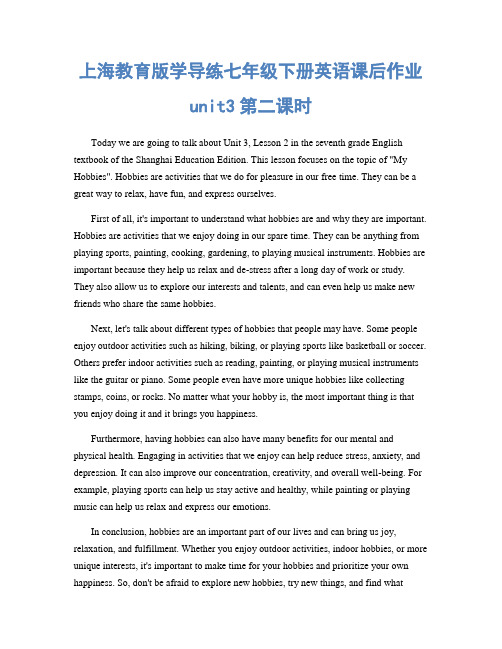
上海教育版学导练七年级下册英语课后作业unit3第二课时Today we are going to talk about Unit 3, Lesson 2 in the seventh grade English textbook of the Shanghai Education Edition. This lesson focuses on the topic of "My Hobbies". Hobbies are activities that we do for pleasure in our free time. They can be a great way to relax, have fun, and express ourselves.First of all, it's important to understand what hobbies are and why they are important. Hobbies are activities that we enjoy doing in our spare time. They can be anything from playing sports, painting, cooking, gardening, to playing musical instruments. Hobbies are important because they help us relax and de-stress after a long day of work or study. They also allow us to explore our interests and talents, and can even help us make new friends who share the same hobbies.Next, let's talk about different types of hobbies that people may have. Some people enjoy outdoor activities such as hiking, biking, or playing sports like basketball or soccer. Others prefer indoor activities such as reading, painting, or playing musical instruments like the guitar or piano. Some people even have more unique hobbies like collecting stamps, coins, or rocks. No matter what your hobby is, the most important thing is that you enjoy doing it and it brings you happiness.Furthermore, having hobbies can also have many benefits for our mental and physical health. Engaging in activities that we enjoy can help reduce stress, anxiety, and depression. It can also improve our concentration, creativity, and overall well-being. For example, playing sports can help us stay active and healthy, while painting or playing music can help us relax and express our emotions.In conclusion, hobbies are an important part of our lives and can bring us joy, relaxation, and fulfillment. Whether you enjoy outdoor activities, indoor hobbies, or more unique interests, it's important to make time for your hobbies and prioritize your own happiness. So, don't be afraid to explore new hobbies, try new things, and find whatmakes you happy. Remember, life is too short to not do what you love, so go out there and enjoy your hobbies to the fullest!。
七年级英语下册同步练习册参考答案
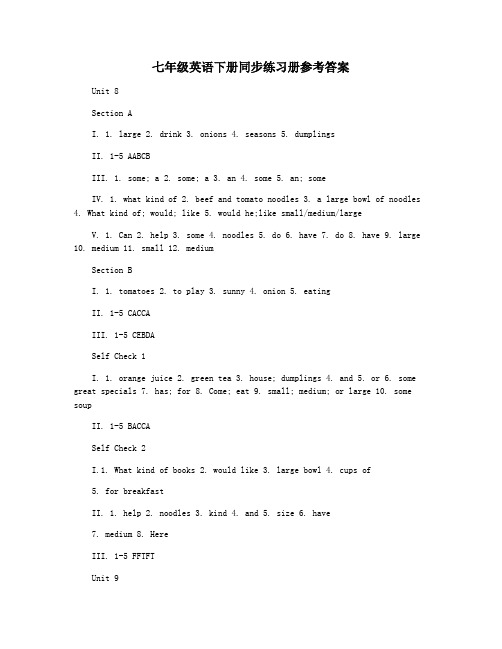
七年级英语下册同步练习册参考答案Unit 8Section AI. 1. large 2. drink 3. onions 4. seasons 5. dumplingsII. 1-5 AABCBIII. 1. some; a 2. some; a 3. an 4. some 5. an; someIV. 1. what kind of 2. beef and tomato noodles 3. a large bowl of noodles 4. What kind of; would; like 5. would he;like small/medium/largeV. 1. Can 2. help 3. some 4. noodles 5. do 6. have 7. do 8. have 9. large 10. medium 11. small 12. mediumSection BI. 1. tomatoes 2. to play 3. sunny 4. onion 5. eatingII. 1-5 CACCAIII. 1-5 CEBDASelf Check 1I. 1. orange juice 2. green tea 3. house; dumplings 4. and 5. or 6. some great specials 7. has; for 8. Come; eat 9. small; medium; or large 10. some soupII. 1-5 BACCASelf Check 2I.1. What kind of books 2. would like 3. large bowl 4. cups of5. for breakfastII. 1. help 2. noodles 3. kind 4. and 5. size 6. have7. medium 8. HereIII. 1-5 FFTFTUnit 9Section AI. 1. were; was 2. meet; met 3. having 4. called; was; said 5. did; playedII. 1-5 CCBAAIII. 1. on Saturday morning 2. last weekend 3. do; homework 4. do some reading 5. beautiful beach 6. clean one’s room 7. the library 8. the movies 9. the pool 10. play tennis 11. playvolleyball 12. play the guitar 13. study for 14. practice English 15. great; OK; wasn’t 16. did; do; stayed; studied for the math test; What about; visited 17. On Saturday eveningSection BI.A 1. week 2. practise 3. spend 4. test 5. middleB 6. cleaned 7. had 8. wanted 9. was 10. visitedII. 1-5 BAABCIII. 1. practise one’s guitar 2. stay at home 3. study for the test 4. in the afternoon 5. study geography 6. a little difficult 7. play sports 8. clean the room 9. go shopping 10. have abusy weekend/day 11. play chess 12. play computer games 13. play soccer with 14. visit friends 15. watch a movie 16. watch TV 17. read a book about history 18. For most kids 19. went shopping20. had a busy weekendSelf Check 1st month 2. sad 3. go for a walk 4. play with 5. sit down 6. look for7. watch; do 8. enjoys their weekendsII. 1. She was at school two hours ago.2. He wasn’t a great singer in 1999.3. He often went to the mountains with his friends last month.4. I wrote a letter to my brother yesterday evening.5. He had a glass of milk this morning.III. 1-5 BCACBSelf Check 2Ⅰ. 1. what about 2. to have 3. stayed at 4. talk show 5. How; spendⅡ. 1-5 CDAEBⅢ. 1-5 CBACB 6-10 CAABBUnit 10Section AI. 1. summer 2. center 3. exam 4. expensive 5. decideII. 1-5 BCBABIII. 1. go to the mountains 2. stay at home 3. visit my uncle 4. go to summer camp 5. visit museums 6. go on vacation 7. study for exam 8. pretty good 9. did; go on vacation; went; was; waspretty good 10. were; were 11. was; was hot; rainy 12. How were; were unfriendlySection BI.A 1. awful 2. walk 3. classmate 4. waterB 5. cry 6. exams 7. rainy 8. wereII. 1-5 CBBBAIII. 1-5 CDEABSelf Check 1I.1. didn’t make 2. Did; go 3. What did; do 4. Where did; go 5. went shopping II.1. did; go; summer camp 2. How; were; unfriendly 3. Did; No 4. makes me clean 5. had fun talkingIII. 1-5 ABCACSelf Check 2I. 1-5 CBABC 6-10 ABCBAII. One possible version:Sunday, April 9thThe weather was fine. All my classmates went to the park.We climbed the hills, boated on the lake, and flew kites all morning. At noon, we had a picnic near a big tree. In the afternoon, some girls sang and danced, some boys talked in English, and some studentsplayed games there. When we went home, it was late. I was tired, but I was really happy.感谢您的阅读,祝您生活愉快。
七年级上下册英语同步练习册答案

七年级上下册英语同步练习册答案语数英最为三门主课,看起来毫不相干,但三科的学习方法其实基本都是一样的,数学记公式,语文记古诗,英语记单词。
学习英语,需要把陌生的单词片语和句型语法不断的熟悉和熟练。
下面是给大家整理的一些七年级英语同步练习册的答案,希望对大家有所帮助。
七年级下册英语同步练习册答案Unit 12 section A一.A)1.has 2.are watching 3.playing 4.did 5.bought (B)6.fight7.outside8.classroom9.else 10.hall二. CBDCD三.1Can eat e to 3.No don’t 4.Don’t listen 5.other things四1. thoes rules 2.sports shoes 3.arrive late for 4.in the dining hall 5.atclassroom outside五.CAFDESection B一.(A)1. on 2.to 3. from to 4.at on 5.in by at (B) 6.children7.talking8.any 9.her 10.speaking二.1~5. DCABC 6~10. CDADD三.1.Do have to 2.Don’t run 3.Can play 4.have fun 5. can’t have to四.1.Do you usually help your mom make dinner?2.Don’t talk loudly in the classrooms!3.I have to go to bed by 10 o’clock.4.Do have to go to the Children’s Palase to learn the paino?5.Can you meet friends at night?五.1~5.CABDA 6~10CBDCA六.Welcome to School Library2.Don’t take your food into the libray or eat in here .3.它们会使书本潮湿。
沪教版英语七年级下册练习题

以下是为⼤家整理的沪教版英语七年级下册练习题的⽂章,供⼤家学习参考!⼀. 根据课⽂,写出以下单词和短语。
忘记 __________________(原型) ____________________(过去式)灰⽩的头发____________________ 也____________________ 照顾____________________ 讲笑话____________________ 使我笑____________________ ⼀个戴眼镜的⾼个⼦⼥孩__________________ 取笑别⼈____________________ 擅长____________________ 充满欢乐____________________ 对........严格要求____________________ ⿎励我们____________________ 给我们⽀持____________________ 放弃____________________ 把乒乓球___________________ ⼆.完成句⼦。
1. 别给他烟了,他正在努⼒戒烟。
Don't offer him a cigarette. He's trying to__________ __________ smoking. 2. 别的孩⼦总拿他开玩笑,因为他⼜胖⼜戴眼镜。
The other children always__________ __________ __________ Him because he is fat and wears glasses. 3. 我喜欢语⽂也喜欢英语。
I like Chinese and English __________ __________. 4. ⼩明的⽗母对他学习要求很严格。
Xiao Ming's parents __________ __________ __________ his studies. 5. ⼩时候奶奶照顾我。
七年级下册英语同步练习册及答案

七年级下册英语同步练习册及答案## 七年级下册英语同步练习册及答案### Unit 1: My Day#### Exercise 1: Vocabulary PracticeA. Fill in the blanks with the correct words.1. I usually wake up at ________ in the morning.2. After breakfast, I go to ________.3. I have lunch at ________.4. I play basketball in the ________.Answers:1. seven2. school3. noon4. afternoonB. Match the words with their meanings.- wake up- go to bed- homework- have breakfastAnswers:1. 醒来2. 上床睡觉3. 做作业4. 吃早饭#### Exercise 2: Grammar FocusA. Rewrite the sentences in the future tense.1. I watch TV at night.2. She does her homework in the evening.Answers:1. I will watch TV at night.2. She will do her homework in the evening.B. Choose the correct option to complete the sentence.1. He ________ his homework every day.- A) does- B) did- C) doAnswer:A) does### Unit 2: My Favourite Subject is Science#### Exercise 1: Vocabulary ChallengeA. Complete the sentences with the given words.1. I like ________ because it's interesting.2. ________ is my favourite subject.3. We have ________ class on Tuesdays.Answers:1. Science2. ScienceB. Fill in the blanks with the correct prepositions.1. We have lunch ________ noon.2. I go to the library ________ the weekend.Answers:1. at2. on#### Exercise 2: Reading ComprehensionRead the passage and answer the questions.Passage:Tom likes science very much. He thinks it's exciting to learn about the universe and the laws of nature. He often spends his free time reading science books and doing experiments.Questions:1. What does Tom like?2. Why does he think science is exciting?Answers:1. Tom likes science.2. He thinks it's exciting to learn about the universe and the laws of nature.### Unit 3: My School#### Exercise 1: Word FormationA. Change the given words into their plural forms.1. ClassroomAnswers:1. Classrooms2. StudentsB. Use the correct form of the words to fill in the blanks.1. There are many ________ in our school.2. We have ________ in our school.Answers:1. classrooms2. students#### Exercise 2: Listening PracticeListen to the dialogue and fill in the blanks.Dialogue:A: Hi, what's your school like?B: It's big and beautiful. We have a library, a gym, and a large playground.Answers:1. big2. beautiful3. library4. gym5. playground### Unit 4: My Pen Pal#### Exercise 1: Vocabulary MatchMatch the words with their correct definitions.- hobby- collect- pen pal- stampAnswers:1. 爱好2. 收集3. 笔友4. 邮票B. Use the words to form sentences.1. My hobby is ________.2. I like to ________ stamps.Answers:1. collecting2. collect#### Exercise 2: Writing SkillsWrite a short letter to your pen pal introducing yourself. Dear [Pen Pal's Name],I hope this letter finds you well. My name is [Your Name], and I am a student in [Your School]. I have many hobbies, such as [Your Hobbies]. I am excited to learn about you and your country. Please write back soon.Best wishes,[Your Name]### Unit 5: My Future#### Exercise 1: Vocabulary ExpansionA. Fill in the blanks with the correct words.1. I want to be a ________ when I grow up.2. My sister is going to be a ________.Answers:1. doctor2. teacherB. Use the words to form sentences.1. I am going to ________ a lot of books.2. She is going to ________ a new car.Answers:1. read2. buy#### Exercise 2: Grammar PracticeA. Choose the correct option to complete the sentence.1. I ______。
沪教片初中英语七下课课练
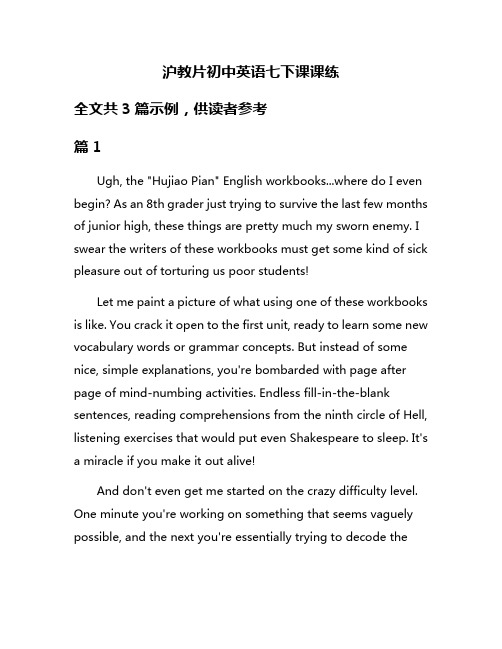
沪教片初中英语七下课课练全文共3篇示例,供读者参考篇1Ugh, the "Hujiao Pian" English workbooks...where do I even begin? As an 8th grader just trying to survive the last few months of junior high, these things are pretty much my sworn enemy. I swear the writers of these workbooks must get some kind of sick pleasure out of torturing us poor students!Let me paint a picture of what using one of these workbooks is like. You crack it open to the first unit, ready to learn some new vocabulary words or grammar concepts. But instead of some nice, simple explanations, you're bombarded with page after page of mind-numbing activities. Endless fill-in-the-blank sentences, reading comprehensions from the ninth circle of Hell, listening exercises that would put even Shakespeare to sleep. It's a miracle if you make it out alive!And don't even get me started on the crazy difficulty level. One minute you're working on something that seems vaguely possible, and the next you're essentially trying to decode theEnigma machine. It's like they go out of their way to find the most obscure, complicated English concepts just to confuse us."But why do they torture us like this?" you may ask. Well, supposedly it's to get us ready for the massive gamut of standardized tests we have to take. Because obviously the best way to prepare for a test is to make the students want to pull their hair out first, right? Nothing builds core skills and confidence quite like repeatedly questioning your life decisions!The absolute worst is when you finally stumble upon that one question or exercise that utterly breaks you. You stare at it, brows furrowed, until your brain feels like a fried computer circuit. No matter how hard you rack your brain, you just can't figure it out. And you know your teacher is going to call on you to explain it in front of everyone too. There's no chance she'll let you live that one down!At that point, the frustration just takes over. You're halfway to just chucking the whole workbook across the room. Who needs to know English this intensely anyways? Maybe you'll just become a hermit and never have to conjugate another verb as long as you live. Ah, blissful ignor篇2The Shanghai Education Edition English Textbooks - A Student's PerspectiveAs an eighth grader in Shanghai, the "Shanghai Education Edition" English textbooks have been a constant companion throughout my middle school years. While some students may find them dry or dull, I've grown to appreciate the methodical approach and comprehensive exercises these books offer. The "Course Exercises" section, in particular, has been instrumental in solidifying my understanding of the concepts introduced in each unit.The Course Exercises start with a warm-up section called "Getting Started," which eases us into the topic with simple questions or prompts related to the unit's theme. It's a gentle way to activate our prior knowledge and get our minds focused on the subject matter. From there, we dive into the "Vocabulary" exercises, where we practice using the new words and expressions introduced in the unit's texts and dialogues.I'll admit, memorizing vocabulary lists can be tedious, but the exercises make it more engaging. They go beyond simple definitions by providing example sentences and contexts for each word. There are also exercises that challenge us to use thewords in our own sentences or short paragraphs, reinforcing our understanding and ability to use them accurately.The "Grammar" section is where things start to get more challenging, but also more rewarding. The exercises here are designed to help us understand and apply the unit's grammatical concepts through a variety of tasks. From identifying parts of speech to rewriting sentences using different tenses or structures, these exercises really put our knowledge to the test.What I appreciate about the grammar exercises is that they gradually increase in difficulty, allowing us to build confidence before tackling the more complex concepts. And when we do encounter a particularly tricky grammar point, the exercises provide clear explanations and examples to guide us through.But the Course Exercises aren't just about vocabulary and grammar – they also place a strong emphasis on the four language skills: listening, speaking, reading, and writing. The "Listening" exercises, for instance, prepare us for the audio components of the unit by introducing key vocabulary and providing comprehension questions to answer as we listen.The "Speaking" exercises encourage us to practice our oral communication skills through role-plays, discussions, and presentations. While these can be nerve-wracking for somestudents (myself included), they're essential for building confidence and fluency in using English in real-world situations.The "Reading" exercises are perhaps my favorite part of the Course Exercises. They provide a variety of texts, ranging from narratives and articles to advertisements and poetry, each accompanied by comprehension questions and analysis tasks. These exercises have not only improved my reading comprehension but have also exposed me to a diverse range of texts and genres.Finally, the "Writing" exercises are where we get to put all our skills together and produce our own written work. From short paragraphs to longer essays, these exercises challenge us to organize our thoughts, use appropriate vocabulary and grammar, and communicate our ideas effectively in writing.One aspect of the Course Exercises that I particularly appreciate is the way they integrate the various skills and concepts. For example, a writing exercise might require us to use specific grammatical structures or vocabulary words introduced earlier in the unit. This kind of integration reinforces our learning and helps us see how the different elements of language are interconnected.Of course, no textbook is perfect, and there are times when I've found the Course Exercises to be a bit dry or repetitive. But overall, I've come to recognize their value in solidifying my understanding of the English language and preparing me for the challenges of higher-level study.As I look ahead to high school and beyond, I know that the skills and knowledge I've gained from the Shanghai Education Edition English textbooks, particularly the Course Exercises, will be invaluable. They've taught me the importance of consistent practice, attention to detail, and a willingness to tackle challenging concepts head-on.While some students may groan at the sight of yet another exercise, I've learned to embrace them as opportunities for growth and improvement. After all, mastering a language as complex and nuanced as English requires dedication and hard work – and the Course Exercises have provided me with the tools and guidance I need to keep pushing forward on that journey.篇3Hu Jiao Pian English Textbook Exercises: A Student's PerspectiveAh, the "Hu Jiao Pian" textbook exercises - the bane of every 7th grader's existence in Shanghai! Just when we thought we had finally mastered the basics of English grammar and vocabulary, these exercises come along to remind us how much more there is to learn. But you know what? I've actually grown to appreciate the challenges they present. Let me take you through a typical unit and you'll see what I mean.It usually starts off deceptively simple, with some vocabulary words and short phrases to memorize. "Oh, this will be a breeze,"I always think to myself. But then we get to the first reading comprehension passage and WHAM! It hits me like a ton of bricks. Who writes this stuff? Certainly not anyone concerned about going easy on middle schoolers! The passages are dense, filled with idiomatic expressions and cultural references that go right over my head. I find myself having to read each sentence multiple times, jotting down notes in the margins, and fumbling through my dictionary constantly. It's a healthy dose of humility, that's for sure.But you know what? Slowly but surely, as I chip away at deconstructing the passage, things start to make sense. I begin to pick up on patterns in the language and make connections to concepts we've learned before. Each reading brutally assaults myabilities at first, but then allows me to rebuild them stronger than ever. It's like a muscle being torn down through exercise, only to grow back bigger and stronger during the recovery period. Suddenly, idiomatic expressions that once seemed indecipherable start to click, and I can visualize the cultural contexts being described. Perseverance pays off in a very tangible way.Then we move on to the grammar exercises, which systematically drill every tense, clause, and exception into our brains through repetition and increasingly complex examples. Just when I think I have the present perfect tense figured out, an exercise will throw a curveball with some obscure exception that makes me doubt everything I know. The examples get convoluted and fatigue starts to set in, but that's all part of the process of developing true mastery. I've learned that there are no shortcuts - putting in the reps is the only way to achieve long-term retention and fluency. It's grueling, but I know I'll be grateful later when I can wield these skills like a well-oiled machine.Of course, the pain doesn't stop there. We then proceed to writing exercises that challenge us to synthesize everythingwe've learned into clear, cohesive passages and essays. We haveto recall vocabulary, apply grammatical rules, organize our thoughts logically, and be mindful of stylistic elements like flow and transition words. My early attempts are alwayscringe-worthy, but the key is using the feedback to incrementally improve. I have pages of marked-up drafts that were once sources of frustration, but are now badges of honor showing how far I've come. Instead of looking at the red ink as a sign of failure, I've learned to embrace it as a roadmap for growth.Finally, we arrive at those dreaded listening exercises that make me question if I'm simply not cut out for English listening comprehension. The speakers have ridiculously thick accents (or maybe I just can't distinguish accents at all yet?) and talk at a mile a minute. I'll play back the audio clip four or five times, analyze every syllable, and still only understand about half of what was said. But then I read the transcript and mentally kick myself for missing obvious vocabulary and grammatical clues that should have cued me into the meaning. Slowly but surely though, as I rack up more and more listening reps, common patterns and speech quirks become familiar instead of alien. My ears get trained for the ebbs and flows of spoken English. What once sounded like indecipherable gibberish starts to resolve into understandable communication.So while the "Hu Jiao Pian" exercises are undoubtedly a grind, I've come to appreciate them as integrated training regimens that holistically develop all aspects of English proficiency. The difficulty ebbs and flows, but it's always there, applying strategic pressure to push me beyond my comfort zone over and over again. With each unit, I'm simultaneously being broken down and built back up stronger, more skilled, and more resilient. And at the end of the semester, when I retrospectively compare my abilities to where I began, the growth is undeniable and massively rewarding. The "Hu Jiao Pian" exercises are teaching me so much more than just English - they're cultivating grit, perseverance, and a growth mindset that will serve me well in all aspects of life. So thanks, Shanghai education system, for not going easy on me. The pursuit of mastery is painful, but profoundly fulfilling. I wouldn't have it any other way.。
(完整word版)七年级下册英语同步练习册
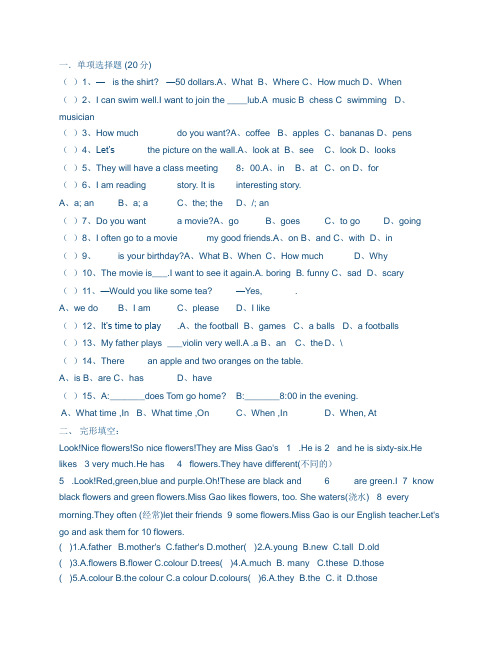
一.单项选择题 (20分)()1、— is the shirt? —50 dollars.A、What B、Where C、How much D、When()2、I can swim well.I want to join the ____lub.A music B chess C swimming D、musician()3、How much do you want?A、coffee B、apples C、bananas D、pens()4、Let’s the picture on the wall.A、look at B、see C、look D、looks()5、They will have a class meeting 8:00.A、in B、at C、on D、for()6、I am reading story. It is interesting story.A、a; anB、a; aC、the; theD、/; an()7、Do you want a movie?A、go B、goes C、to go D、going()8、I often go to a movie my good friends.A、on B、and C、with D、in()9、is your birthday?A、What B、When C、How much D、Why()10、The movie is___.I want to see it again.A. boring B. funny C、sad D、scary()11、—Would you like some tea? —Yes, .A、we doB、I amC、pleaseD、I like()12、It’s time to play .A、the football B、games C、a balls D、a footballs()13、My father plays ___violin very well.A .a B、an C、the D、\()14、There an apple and two oranges on the table.A、isB、areC、hasD、have()15、A:_______does Tom go home? B:_______8:00 in the evening.A、What time ,InB、What time ,OnC、When ,InD、When, At二、完形填空:Look!Nice flowers!So nice flowers!They are Miss Gao's 1 .He is 2 and he is sixty-six.He likes 3 very much.He has 4 flowers.They have different(不同的)5 .Look!Red,green,blue and purple.Oh!These are black and6 are green.I7 know black flowers and green flowers.Miss Gao likes flowers, too. She waters(浇水)8 every morning.They often (经常)let their friends9 some flowers.Miss Gao is our English teacher.Let's go and ask them for 10 flowers.( )1.A.father B.mother's C.father's D.mother( )2.A.young B.new C.tall D.old( )3.A.flowers B.flower C.colour D.trees( )4.A.much B. many C.these D.those( )5.A.colour B.the colour C.a colour D.colours( )6.A.they B.the C. it D.those( )7.A.doesn't B.don't C.not D.no( )8.A.it B.they C.them D.flower( )9.A.have B.has C.look D.to see( )10.A.no B.much C.any D.some.三.阅读理解Mr Green is from England. He and his wife(妻子)are teachers. They teach English in Beijing. They have a boy and a girl. They are Jack and Mary. Jack is a student, but Mary is not . She is only four.They have two bikes. One is big, and the other is small. The big one is for Jack. The small one is for Mary.On Sundays, sometimes they are at home, sometimes they go to the park. The Greens like China. They have a lot of Chinese friends.()1、Where are the Greens now? They are in .A、China B、America C、England D、Japan()2、What do Mr and Mrs Green do? They .A、study ChineseB、teach EnglishC、look after Jack and MaryD、go to the park()3、What do Jack and Mary have? They have A、cars B、watches C、clocks D、bikes()4、On Sundays, they are sometimes .A、at school B、in the classroomC、at home D、on the bike()5、Mr and Mrs Green .A、have many Japanese friends B、like China very muchC、look the same D、don’t know ChineseBDear Mr. Wang,Someone comes to the office to see you in the morning, but you and your wife are out. He comes here at 10am. Because he is very busy, he goes away half an hour later. He tells me that he is your classmate at college(大学). Now he teaches Chinese in a high school(高中) in this city and he lives near the No. 6 Middle School. He is a very tall man with short hair. He wears a pair of glasses. He tells me his telephone number is 33426685. He is often at home at 7:00 pm. So you can call him in the evening.( ) 6. The author(作者) writes this note(便条) to ______.A. Mr. WangB. Mr. Wang’s wifeC. Mr. Wang’s classmateD. me( ) 7. Mr. Wang’s classmate is __. A. a teacher B. a worker C. a farmer D. an actor( ) 8. When is Mr. Wang’s classmate often at home?A. In the morningB. In the afternoon.C. At 7:00pm.D. We don’t know.( ) 9. How long does Mr. Wang’s classmate stay in the office?A. Ten hours.B. An hour.C. Two hours.D. Half an hour.( )10. Which of the following is TRUE?A. Mr. Wang and his wife are classmates.B. Mr. Wang’s classmate is sho rt.C. Mr. Wang goes out with Mrs. Wang in the morning.D. Mr. Wang’s classmate meets Mr. Wang in the morning.五.词汇 (25分)(一)单词拼写,根据句意和所给单词首字母或汉语提示填空。
